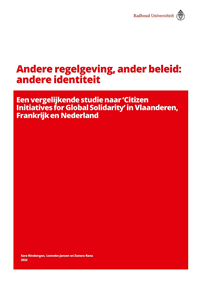By 2030, all United Nations Member States aim to achieve the 17 Sustainable Development Goals (SDGs). One of the key underlying principles of the agenda is that it requires commitment of a wide diversity of actors.
Companies, knowledge institutes, civil society organisations and governments; all of them are being called
upon to contribute to the agenda. The appeal is not only being done on institutionalised, professional actors, also citizens are explicitly mentioned as a key actor of change. Most often they are being approached as individuals that are, for example, urged to revise their consumption patterns. In this underlying study, we look at the role organised citizens play in the realisation of the SDG agenda. In particular, we study how citizen led development organisations based in the Global North contribute to sustainable development by partnering with citizens in the Global South.
In the past year, academic interest in the role of citizens as development actors has increased significantly
(see for example Haaland et. al, 2023). This growing interest goes hand in hand with the increasing number of these so-called Citizen Initiatives for Global Solidarity (CIGS) in many countries in the Global North since mid-2000. So far, most studies focused on single countries, studying CIGS from one particular country in the Global North. These various country-studies learned that, in addition to a certain common identity, there are important differences in the identity and positioning of CIGS across different countries. To come to a more systematic understanding of these differences and understanding the implications of these differences for the role CIGS play in sustainable development, in 2020 a first country comparison research project was initiated.
This underlying report is the result of the second phase of a two-phased study aimed at comparing CIGS in
Belgium, France, the Netherlands, and Denmark. The first phase of the study (2021–2022) focused on the
identity, role and positioning of northern based CIGS in the Global North (Kinsbergen et al. 2022). Building on the findings of this study, the second phase (2023-2024) questions the role of CIGS as contributors to
sustainable development. Building on the work of Edwards and in line with previous CIGS studies, we question whether projects, programmes or organisations make a lasting impact on the communities where they work (Edwards 1999; Kinsbergen et al., 2021). Interventions that are locally led and aimed at tackling root causes are more likely to be expected to make a lasting impact. We therefore study the type of development interventions CIGS initiate and/or support (intervention type) and the way they give shape to their partnerships (intervention manner). In line with previous studies (Kinsbergen, Schulpen and Ruben, 2017; Kinsbergen and Koch, 2022), we consider both aspects as preconditions for the sustainability of the development efforts of CIGS.

